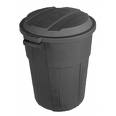
As a member of the local rose society, I get many tips for growing roses and this is one of the best. It is an alfalfa tea that I use every 6 weeks during the growing season on all my roses with considerable success; leaves get greener, flower color is richer, and over all vigor increases. This tea should be used immediately after the first flush of bloom in spring. I have over 50 roses so I make a big quantity as given below but you can easily cut the recipe in half or quarters, etc. This tea should be used with the regular fertilizing program unless you choose to fortify it as explained below. You will need a gallon per bush, but about half that amount for miniatures. If you make extra you can use it on your annuals and perennials with equal success. I keep the garbage can ready for use hidden in my garden near a water supply so I can easily use the tea on the plants once it is ready.
You will need:
Large garbage can (30/32 gallon) with lid or similar container
About 12 cups of alfalfa pellets
Water to fill the container
Directions:
Mix all the ingredients, cover tightly to eliminate mosquitoes, and let steep for 2-3 days. Stir and recover ever 2-3 days for a week, no longer. At the end of a week the contents should be foamy and foul smelling because of the fermentation process that has gone on. Do not stir; let the solid material stay at the bottom of the container and refill the can for a second batch that will be ready in a couple of days.
Use a gallon bucket to apply the tea to the roses; 1 gallon on most plants, more on very large plants, and about ½ gallon on miniatures (remember that in a couple of days you will have another batch.)
When you have used up two batches of tea, sludge will remain in the bottom of the can. Distribute this sludge on your perennials as an organic mulch or add it to your compost pile. The sludge is not attractive to the eye or nose so use it in the back of the bed.
Why is this so special? Alfalfa provides nitrogen, phosphorous, and potassium in the ratio of 5-1-2, and is also a good source of calcium, iron, magnesium, zinc, vitamins (A, D, B1, B6, E, K and U) and triaconatol, that is food for soil organisms that stimulate growth.
You don’t have to make tea to use the alfalfa. Alfalfa pellets or meal can be scattered around each rose bush and watered in but the tea acts more quickly. If you use alfalfa meal, do so on a day without wind or you will get a face full of meal. If you use alfalfa pellets, use the ones for rabbits as they are smaller and will dissolve more quickly.
Fortified Tea (Optional):
If you want to make a fortified tea, add the following just before applying:
8 Tablspoons of Sesquestrene 330 or other iron chelate
½ cup Epsom Salts (to promote basal shoot growth and wards of slugs and snails)
1 cup of 20-20-20 soluble fertilizer (or the equivalent)
I use a high nitrogen fertilizer before the roses bloom in spring and then apply the fortified alfalfa tea after they bloom every six weeks all summer until fall when I stop fertilizing and dead heading so they will shut down for winter.
Treat your roses to this great elixir and they will give you pleasure all season!

I think alfalfa is an absolute miracle! It’s made a huge difference in the number of blooms, new canes, new growth in general on my established roses as well as the dozens of rose seedlings I’m nurturing. For the first time, I tried alfalfa tea on my roses, and I’m not sure I see any advantage over using the pellets. The pellets are so much easier…
Just an observation…
Love your blog!
Jeff,
The advantage of the tea is speed…the stuff in alfalfa is dissolved in the water. Eventually, rain or overhead watering will do the same thing. I have drip irrigation so it is not going to help and rain here is scarce in the summer. So, the tea is best or me but you may have a different situation and the pellets would be better.
Karen